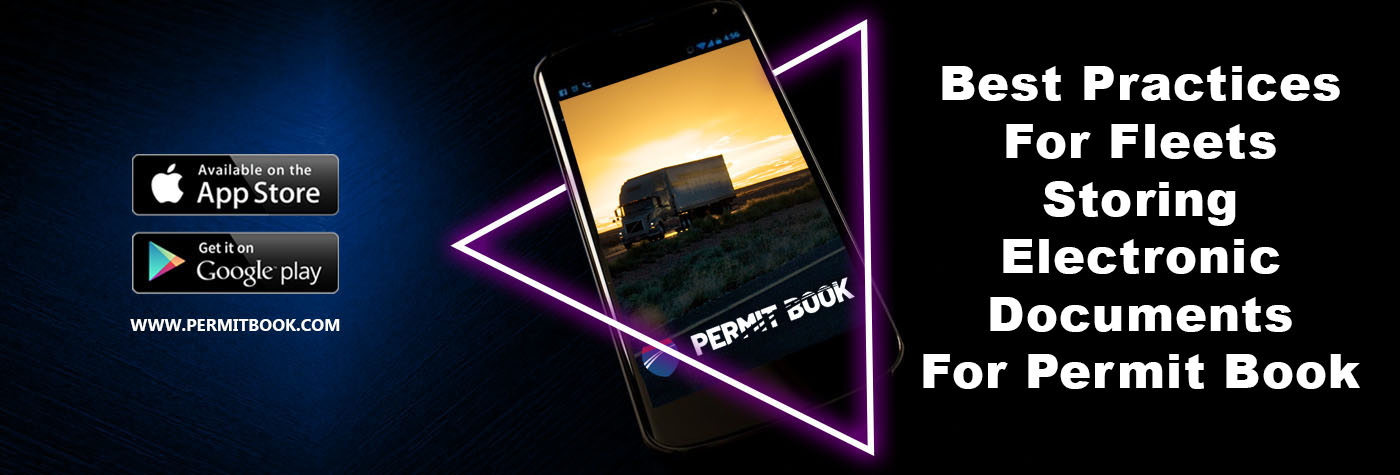Best Practices For Fleets Storing Electronic Documents For Permit Book

In-cab paper permit books have annoyed owner-operators and fleets for decades. Operators of commercial trucks often misplace, forget or simply not aware of the required documents needed in the cab of the truck for roadside inspections.
The problem is particularly acute with large fleets who manage dozens of company documents for each driver, truck, and trailer, have multiple terminals and/or deal with drivers switching trucks or trailers, sometimes multiple times each day.
No matter what, the right documents need to be in the right truck for the right driver and trailer. A mistake can result in a citation, downtime, or worse. Until now, there have been no shortcuts. The burden is simply amplified with every terminal, truck, trailer and driver in the fleet.
Permit Book is a first of its kind driver app that provides drivers electronic accessibility to documents from any IOS or Android based smart device, even when out of cell service.
This guide walks through best practices of what documents should be stored in Permit Book along with other important documents fleets could consider providing to the driver when utilizing Permit Book app.

Required Trucking Credentials For All In-cab Permit Books
-
- Truck registration: Every vehicle is required to carry proof of valid registration. This document proves your truck is properly registered and lists VIN, license plate, make and model as well as information on the registered owner. Commercial truck registrations expire annually and must be renewed with a copy of the renewal in the truck prior to the old one expiring.
- Annual inspection: Commercial trucks and trailers are required to carry proof of an annual maintenance inspection performed by a Certified mechanic. This inspection confirms your equipment has been deemed safe to operate and defect free. Annual means dates are important. Check for expiration. New inspections and updated documents must be obtained prior to the expiration date.
- IFTA Decals/License: If you operate above 26,000 lbs and interstate, you need IFTA decals on the side of the truck and an IFTA License in the truck. Both must be updated annually.
Federal, State or Type of Haul Specific Documents For Permit Books
-
- Lease agreement: If you are an owner operator leased to another company or have leased a truck from a leasing company, you must carry a copy of the lease agreement. These vary between a single page and multipage contracts. It’s a document listing equipment ownership and lease terms.
- Hazmat permits: If your company is transporting placardable quantities of Hazmat materials, you need to have the proper permits. For non-high-risk shipments, you need an FMCSA hazmat permit that certifies your company has the appropriate endorsements. These permits have expiration dates and can be valid for single or multiple years. In addition to the federal permit requirements, individual states may require separate hazmat permits.
- ELD instructions: Written instructions on how to operate your electronic logging device. The DOT mandates these have to be kept inside your truck and made available during an inspection.
- Intra-state authorities: Intra-state authority allows you to pick up at a point within a certain state, to deliver to another point within that state such as Florence, KY to Louisville, KY.
- Kentucky Carriers Vehicle Inventory List: If your vehicle if 60,000 pounds or greater GVW then it should be registered in the Carriers Vehicle Inventory List for Kentucky or KYU*
- New Jersey Business Registration Certificate: New Jersey has detained vehicles in the past for not having a copy of the Business Registration Certificate in the vehicle. Good idea to carry a copy should you operate in the state of New Jersey.
- New Mexico Weight Distance Tax: If operating in NM and your vehicle has GVW greater than 26,000 pounds, you must obtain Weight Distance Tax* permits for each vehicle which will enable you to cross New Mexico without having to pay the mileage (Weight-Distance) tax out of pocket at the time. The carrier can then report the taxes due on a quarterly basis for all subject vehicles.
- New York’s Highway Use Tax: If your vehicle has GVW greater than 18,001 pounds or more and enters New York you are subject to New York’s Highway Use Tax. You will need to carry the paper copy of the NY HUT registration for your truck with your permits and also affix a state issued decal to the front of the truck
- SCAC Code: You may also need on occasion to know the SCAC Code* for your Carrier company. Carrying a copy of your Carrier SCAC Code from National Motor Freight Traffic Association, Inc. may be required to access military facilities.
Other Documents That Would Be Great For Permit Book
-
- Company Policies
- Driver Training Papers or Links
- Dispatcher or Broker Contact Information
- Receiver Unloading Instructions
- Accident Reporting Instructions
- Detention Approval Forms
- Trip Reports
- Maintenance Record Reports
- Company Meetings Notes and/or Newsletters
- Proof of MC Authority/Safer Snap Shot
- Proof of UCR Payment
- Proof of Insurance
- Copy of Driver Medical Card And CDL
- Over Dimension Permits
- Heavy Vehicle Use Tax (HVUT) Proof of Payment
Permit Book allows the carrier the flexibility to decide what the driver should have with him/her. By assigning the documents to specific drivers and units on the back end, the documents become available to the driver via the cloud based application.
Whether an Owner Operator or a large, multi-terminal fleet, the experts at Glostone can insure your equipment is and stays road legal with their asset management program. Learn more about their fleet licensing service here.


